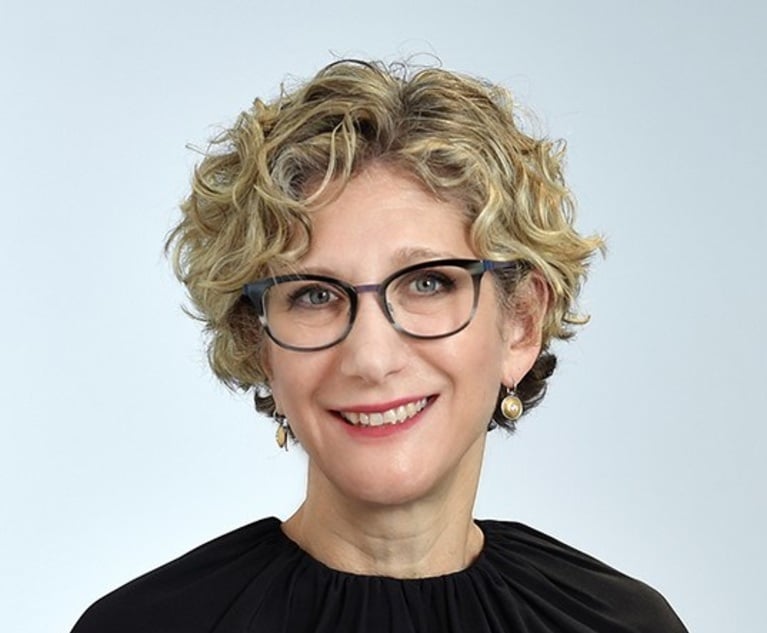Pandemic and Recession Take Toll on Professional Development Efforts
A new survey shows significant changes in how firms are delivering learning programs. It also shows that learning and development teams have been casualties of the COVID-19-induced recession.
June 22, 2020 at 06:23 PM
6 minute read
Law firm professional development leaders are feeling stretched.
As one chief learning officer said in a recent survey, "My greatest challenge is juggling immediate needs to navigate the crisis and support the longer-term strategic training objectives."
That survey, conducted from May 26 through June 7 by U.S.-based Leadership for Lawyers and U.K.-based Cote Consultants, found that many law firms plan on using new methods to deliver training in the future. At the same time, it also found that training and coaching programs have been dramatically cut, and many professional development staff have been laid off as a result of the pandemic.
A summary of the results of the survey, which included respondents from 43 firms based in the U.S. and the U.K., as well as in the EU, Africa and Asia, follows.
|Firm Cutbacks Hit Professional Development Activities
Sixty-five percent of firms have suspended all or some of their professional development activities, such as training and coaching during the crisis. Yet, 23% of firms reported an increase in learning interventions. Those who reported an increase tended to be from large or global firms that have the resources and infrastructure to provide effective online learning programs.
More than 70% of firms have cut learning and development budgets for 2020; 37% have cut budgets in excess of 20% for the year. About 54% of firms expect further budget cuts for 2021.
Thirty-three percent of firms responding to the survey reported that their professional development team has experienced layoffs or furloughs over the past few months. About 19% of firms expect that their team will see further layoffs in the next six months.
Despite budget and staff reductions, professional development teams are working hard to deliver training programs via Zoom and online learning platforms. Learning professionals reported that they are working longer hours from home and that the volume of work has increased significantly since the lockdown.
Budget cuts are hitting external coaches and consultants as well. According to the survey, 40% of firms will hire fewer coaches in Q3 and Q4 of 2020, and 42% of firms indicated their coaching use will remain the same.
|Office Reopening Increases Stress and Workload
About 50% of firms expect to reopen during the summer months. In fact, 26% said they have already opened their offices and 23% will likely reopen in the fall of 2020. Notably, 72% of professional development leaders said they prefer a mix of working from home and the office. Only 14% prefer to return to the office "as pre-COVID" and 14% prefer to work solely at home.
While many firms had been slow to offer robust "work-from-home" policies prior to the crisis, the pandemic experiment has shown that lawyers and staff can be productive in a distributed environment. We expect to see firms offering more flexible working arrangements even after offices reopen later this year.
While the isolation of work-from-home presents both mental health and logistical challenges to learning professionals, "the return-to-office" phase presents unique problems as well. Respondents frequently mentioned the difficulty of onboarding new associates, laterals and summer clerks remotely. Connecting new hires with other lawyers and staff via phone and video chat is awkward. The return-to-office phase requires additional policies and remote training for all employees, adding to the workload of learning professionals.
|The Future Is Uncertain, but Technology Will Play Major Role
When do firms expect to resume live training? About 42% said, "we don't know how or if we will resume live training." While 9% will resume live training Q3/Q4, 21% are making plans for Q1 2021, at the earliest. Meanwhile, professional development leaders are working on delivering a wide range of programs that help lawyers and staff deal with the crisis, including:
- Resiliency and dealing with stress/isolation.
- Business development and networking in a social distancing environment.
- Leadership and leading remote teams.
- Inclusion, diversity and anti-racism.
- Work productivity.
- Return to office practices.
When asked about learning and development methods that will change the most over the next few years, e-learning courses came out on top. About 86% of respondents indicated that e-learning courses and virtual classrooms will have the biggest impact on learning programs. Approximately 60% said that blended (e-learning and live training) will increase and 23% said that gamified learning will increase.
"Coaching by managers and peers" and "user-generated content" will also be used significantly more in the future.
"Sending lawyers and staff to external conferences" took the biggest hit, as 81% of respondents indicated that this method will decrease over the next two years.
Nearly all firms said that virtual classrooms and mobile learning will have some or significant impact on professional service learning and development over the next two years. About half of the firms have a learning management system in place today. Of those who don't have one now, 29% indicated they will invest in one over the next year.
|Conclusions
It's clear from the survey that learning and development teams have been and will continue to be casualties of the COVID-19-induced global recession. Professional development budgets are an easy target when revenue is under pressure. However, firms need to recognize the contribution that learning professionals make to their organizations' success and ensure that they reinvest in them soon.
In many ways, the lasting impact of the COVID-19 pandemic may be to accelerate several existing trends. Flexible working looks like it is here to stay, with 72% of respondents preferring a mix of home and office working. The survey also shows a significant adoption of technology in delivering learning support. Many firms are planning on using new learning methods such as virtual classrooms, user-generated content, gamified learning, and massive open online courses (MOOCs), in addition to continuing to use external coaching, in-house developed programs and peer groups.
There will still be a place for face-to-face development, particularly when behavioral change is the desired outcome. However, we realize that much of the technical training needed can be delivered effectively remotely. It may be that the savings made in the ancillary costs of such training (travel, accommodation, food and drink) that will be saved can be used in delivering the training instead, hence protecting outcomes.
Download the full survey report here.
Ian Paterson is founding partner of Cote Consulting in London. Mark Beese is president of U.S.-based Leadership for Lawyers, headquartered in Evergreen, Colorado. Both provide training, coaching and consulting to law firms and professional service firms globally and frequently collaborate on global projects in the areas of leadership development, design thinking and business development.
This content has been archived. It is available through our partners, LexisNexis® and Bloomberg Law.
To view this content, please continue to their sites.
Not a Lexis Subscriber?
Subscribe Now
Not a Bloomberg Law Subscriber?
Subscribe Now
NOT FOR REPRINT
© 2024 ALM Global, LLC, All Rights Reserved. Request academic re-use from www.copyright.com. All other uses, submit a request to [email protected]. For more information visit Asset & Logo Licensing.
You Might Like
View All


Trending Stories
- 1Deception or Coercion? California Supreme Court Grants Review in Jailhouse Confession Case
- 2State Bar of Georgia Presents Access to Justice Pro Bono Awards
- 3Tips For Creating Holiday Plans That Everyone Can Be Grateful For
- 4Red Tape, Talent Wars & Pricey Office Space Greet Firms Entering Saudi Arabia
- 5A Funny Thing Happened on the Way to Becoming Clerk of the Forum
Who Got The Work
Michael G. Bongiorno, Andrew Scott Dulberg and Elizabeth E. Driscoll from Wilmer Cutler Pickering Hale and Dorr have stepped in to represent Symbotic Inc., an A.I.-enabled technology platform that focuses on increasing supply chain efficiency, and other defendants in a pending shareholder derivative lawsuit. The case, filed Oct. 2 in Massachusetts District Court by the Brown Law Firm on behalf of Stephen Austen, accuses certain officers and directors of misleading investors in regard to Symbotic's potential for margin growth by failing to disclose that the company was not equipped to timely deploy its systems or manage expenses through project delays. The case, assigned to U.S. District Judge Nathaniel M. Gorton, is 1:24-cv-12522, Austen v. Cohen et al.
Who Got The Work
Edmund Polubinski and Marie Killmond of Davis Polk & Wardwell have entered appearances for data platform software development company MongoDB and other defendants in a pending shareholder derivative lawsuit. The action, filed Oct. 7 in New York Southern District Court by the Brown Law Firm, accuses the company's directors and/or officers of falsely expressing confidence in the company’s restructuring of its sales incentive plan and downplaying the severity of decreases in its upfront commitments. The case is 1:24-cv-07594, Roy v. Ittycheria et al.
Who Got The Work
Amy O. Bruchs and Kurt F. Ellison of Michael Best & Friedrich have entered appearances for Epic Systems Corp. in a pending employment discrimination lawsuit. The suit was filed Sept. 7 in Wisconsin Western District Court by Levine Eisberner LLC and Siri & Glimstad on behalf of a project manager who claims that he was wrongfully terminated after applying for a religious exemption to the defendant's COVID-19 vaccine mandate. The case, assigned to U.S. Magistrate Judge Anita Marie Boor, is 3:24-cv-00630, Secker, Nathan v. Epic Systems Corporation.
Who Got The Work
David X. Sullivan, Thomas J. Finn and Gregory A. Hall from McCarter & English have entered appearances for Sunrun Installation Services in a pending civil rights lawsuit. The complaint was filed Sept. 4 in Connecticut District Court by attorney Robert M. Berke on behalf of former employee George Edward Steins, who was arrested and charged with employing an unregistered home improvement salesperson. The complaint alleges that had Sunrun informed the Connecticut Department of Consumer Protection that the plaintiff's employment had ended in 2017 and that he no longer held Sunrun's home improvement contractor license, he would not have been hit with charges, which were dismissed in May 2024. The case, assigned to U.S. District Judge Jeffrey A. Meyer, is 3:24-cv-01423, Steins v. Sunrun, Inc. et al.
Who Got The Work
Greenberg Traurig shareholder Joshua L. Raskin has entered an appearance for boohoo.com UK Ltd. in a pending patent infringement lawsuit. The suit, filed Sept. 3 in Texas Eastern District Court by Rozier Hardt McDonough on behalf of Alto Dynamics, asserts five patents related to an online shopping platform. The case, assigned to U.S. District Judge Rodney Gilstrap, is 2:24-cv-00719, Alto Dynamics, LLC v. boohoo.com UK Limited.
Featured Firms
Law Offices of Gary Martin Hays & Associates, P.C.
(470) 294-1674
Law Offices of Mark E. Salomone
(857) 444-6468
Smith & Hassler
(713) 739-1250











